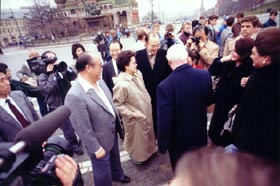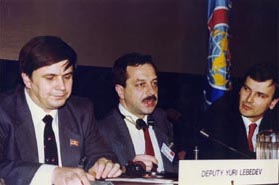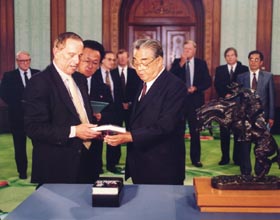
3. Contacts with Communist Leaders

|
| Reverend Moon in Moscow |
 |
| Reverend Moon sponsored Soviet leaders to American Leadership Conference seminars in the United States. |
a. Rev. Moon and
North Korea
Rev. Moon's Cold
War efforts also extended to isolated and potentially volatile North Korea.
Because of his outspoken views against communism, Rev. Moon was long viewed with
hostility in North Korea. As late as 1987 the FBI arrested a reputed member of
the Japanese Red Army, an organization with established ties to North Korea, for
his involvement in an assassination plot which targeted Rev. Moon.
Rev.
Moon nonetheless secured an invitation in November, 1991 to meet with DPRK
President Kim Il Sung. The meeting led to some tangible results. A few months
after this visit, President Kim Il Sung gave his first interview to the Western
Press in 20 years, via The Washington Times. In the interview Kim Il Sung
expressed his desire to improve U.S.-DPRK relations. The meeting also led to an
opportunity to concretely improve such relations via the aforementioned American
Freedom Coalition (AFC).
During May and June of 1992, the AFC conducted
a peacemaking mission to Pyongyang after consultation with the Bush White House.
The 40-person delegation, headed by former Congressman Richard Ichord, included
numerous former Congressmen and federal officials, including former CIA Deputy
Director Max Hugel and Amb. Douglas MacArthur II, nephew and namesake of Gen.
MacArthur, the Supreme Commander of UN troops who had repulsed the 1950 attack
on the South. The AFC delegation targeted the cooling of abusive language
(toward the US and South Korea) by DPRK officials as the principal goal of their
visit. The delegation addressed this and other topics with high-ranking Party
officials, including Kim Young Sun, architect of Pyongyang's foreign policy, and
with President Kim Il Sung himself, who hosted the delegation for lunch and
spent more than three hours responding to their questions.

|
| Meeting between President Kim Il Sung and the American Freedom Coalition delegation in Pyongyang, Korea. |
In a subsequent June 23, 1992 meeting in New York, a North Korean Ambassador
to the United Nations relayed to Congressman Ichord and several other members of
the AFC delegation to Pyongyang that the DPRK, as a consequence of the recent
AFC visit, had made a unilateral decision to cancel its annual anti-American
demonstrations.57 Such demonstrations had taken place every June 25th to
July 27th since the end of the Korean conflict.58 On the
request of the DPRK official, Congressman Ichord conveyed this decision to the
Bush administration, which he did on June 24, 1992. The anti-American
demonstrations have remain suspended since that time.
b. Theological Paradigm
It is useful to reflect upon
the paradigm or prism through which Rev. Moon apparently approached these
meetings with Presidents Gorbachev and Kim. The Divine Principle, the religious
teaching of Rev. Moon, posits the biblical struggle between Cain and Abel as the
underlying dynamic of all historical development. Cain and Abel were brothers;
instead of murder they should have reconciled with each other peacefully. Such a
peaceful reconciliation between hostile brothers was realized by Jacob and Esau.
Their struggle, again between a younger brother and an elder brother, is seen as
a continuation of the original Cain-Abel rivalry. Jacob finally won the respect
of Esau, and thus resolved the Cain-Abel problem in his family. He could achieve
this result by preparing well for his encounter with Esau, having acquired a
certain level of spiritual and material strength. In accord with this view, all
struggling individuals, nations and blocs can be analyzed as taking the
positions of Cain and Abel, Jacob and Esau.
For Rev. Moon, the Cold War
represented a different level and expression of the same Cain-Abel/Jacob-Esau
struggle. Like Jacob, Rev. Moon returned to his homeland to meet Esau (Kim Il
Sung) only once he could be recognized as a man of accomplishment. Having become
a leading anti-communist, Rev. Moon's meeting with President Kim, the most
hardline of communists, took on a wider significance. The peaceful reunion and
reconciliation of these two leaders represented the resolution of the East-West
struggle at the place where the the outbreak of first violent East-West conflict
had occurred following World War II.
Rev. Moon's role in the struggle
against communism did not end with his encounter with Kim Il Sung. According to
his teachings, communism emerged because of real social injustices and is the
consequence of deep-seated human resentment which can only be healed through
service and love. Based on this understanding, Rev. Moon has continued to work
in places such as North Korea and the People's Republic of China, with the
expressed goal of resolving the problem at the very root. It is anticipated that
his involvement will thus continue.